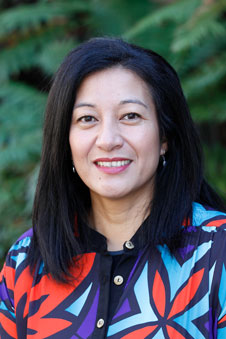 Thursday 15 March 2018 12:59pm
Thursday 15 March 2018 12:59pm
Director of Pacific Development Dr Tasileta Teevale
University of Otago research has revealed what works and what doesn't when it comes to the success of Pacific students, and highlights the need for a tailored university preparation programme.
Director of Pacific Development Dr Tasileta Teevale says the New Zealand first-year tertiary student population is diversifying, with Pacific students making up a significant proportion of the group.
In the last decade, the percentage of Pacific people with a bachelor's degree or higher rose from 5.4 per cent to 8.9 per cent. However, it remains substantially below that of other ethnic groups, namely New Zealand Europeans at 20.7 per cent and Māori at 9.9 per cent.
“These figures indicate that educational disparities exist for Pacific students in New Zealand's tertiary education sector and there is a need to address this gap,” Dr Teevale says.
In a study, just published in the Journal of Australian and New Zealand Student Services Association, she and co-author Assistant Research Fellow Alapasita Teu, explored the experiences of 116 first-year Pacific students at the University of Otago, to identify the enablers and barriers that contributed to academic achievement.
They found students who succeeded in their first year of study used Pacific-centric student support services; had family members who had been to university before; and had different study habits, learning strategies and expectations when compared with their peers who struggled to achieve.
“This study found a suite of tools that Pacific students use to succeed at university and we wanted to share these tools with prospective Pacific students, families and communities.
“We hope Pacific students realise that university is an option post-high school and that New Zealand universities have people and services in place to help them achieve and succeed,” she says.
As first-year academic success is a strong predictor of university completion, Dr Teevale recommends focussing on first-year transition interventions to address the social and academic adaptations that Pacific students need for success in their studies.
She believes there is a place for a Pacific-centric short university preparation programme. Such a programme would encourage and normalise help-seeking behaviour, and work to reduce any stigma attached to help-seeking behaviours for Pacific students.
There is also the potential for a pre-degree programme to address Pacific families' engagement and capacity building, so that they are better able to provide their children with the family support required.
At the institutional level, she believes cultural competency training for university staff who work and engage with Pacific students, as well as curriculum development to ensure academic content includes aspects of the Pacific world, would be beneficial.
“Such measures are likely to increase Pacific students' understanding of and transition into the university environment, and raise awareness among non-Pacific students of their diverse realities.”
An important part of the study is that it tells tertiary institutions what parts of their services were perceived by first-year Pacific students to be useful and contributing to success in their studies.
“We think this is immensely useful feedback to those institutions who strive to meet the needs of their growing proportion of diverse student communities.
“Identifying and addressing the factors that impede academic success for minority students in higher education is a global priority, particularly for countries experiencing rapid changes in university population diversity,” she says.
The University of Otago launched its Pacific Strategic Framework in 2013 which articulates its commitment to meeting the needs of its Pacific student body.
“Meeting diverse student needs, makes good business and societal sense,” Dr Teevale says.
Publication details:
What Enabled and Disabled First-year Pacific Student Achievement at University?
Tasileta Teevale and Alapasita Teu.
Journal of the Australian and New Zealand Student Services Association
For more information, please contact:
Dr Tasileta Teevale
Director Pacific Development
University of Otago
Tel 3 479 8604
Email tasileta.teevale@otago.ac.nz
A list of Otago experts available for media comment is available elsewhere on this website.
Electronic addresses (including email accounts, instant messaging services, or telephone accounts) published on this page are for the sole purpose of contact with the individuals concerned, in their capacity as officers, employees or students of the University of Otago, or their respective organisation. Publication of any such electronic address is not to be taken as consent to receive unsolicited commercial electronic messages by the address holder.
